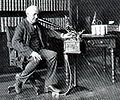Dictation machine
Dictation machine is a sound recording device most commonly used to record speech for later playback or to be typed into print. It has been an essential tool in business, medical, legal, and research environments, allowing for efficient documentation and communication. The evolution of dictation machines from mechanical devices to digital formats has significantly impacted professional practices, particularly in the way information is documented and transcribed.
History[edit]
The development of the dictation machine dates back to the late 19th century, with early models such as the Phonograph invented by Thomas Edison in 1877. Initially intended for entertainment purposes, the potential for business and communication soon became apparent. The 20th century saw the introduction of the Dictaphone and Ediphone, devices that used wax cylinders and later, wax records, for recording. The transition to magnetic tape technology in the mid-20th century marked a significant advancement, improving sound quality and storage capacity.
Types of Dictation Machines[edit]
There are primarily two types of dictation machines: analog and digital.
Analog Dictation Machines[edit]
Analog machines record audio onto tapes. These devices were standard before the advent of digital technology, offering simplicity but limited by physical storage space and sound degradation over time.
Digital Dictation Machines[edit]
Digital machines record and store audio files in a digital format. This technology allows for clearer sound quality, easier editing, and more efficient storage. Digital dictation devices can range from simple handheld recorders to complex systems integrated with computers for direct transcription.
Features and Functionality[edit]
Modern dictation machines offer a variety of features designed to enhance usability and efficiency. These include voice activation, noise cancellation, variable speed playback, and the ability to easily transfer files to a computer or cloud storage. Some advanced models are integrated with speech recognition software, further streamlining the transcription process.
Applications[edit]
Dictation machines are widely used across various fields for different purposes:
- In medicine, doctors use dictation to record patient notes and medical reports, which are then transcribed into patient records.
- In the legal field, attorneys and judges dictate notes, correspondence, and legal documents.
- In business, executives and managers use dictation to capture meeting minutes, memos, and letters.
- In research, scholars and scientists record observations and notes for later analysis.
Advantages and Disadvantages[edit]
The primary advantage of dictation machines is their ability to save time and increase efficiency in documentation processes. However, they also present challenges, such as the need for accurate transcription and the potential for privacy concerns when handling sensitive information.
Future of Dictation Machines[edit]
With advancements in artificial intelligence and machine learning, the future of dictation machines lies in further integration with speech recognition technologies. This evolution aims to minimize the need for manual transcription, making the process more efficient and accurate.
See Also[edit]
-
Dictaphone operator using a machine
-
Edison Dictaphone
-
Dictaphone cylinder machine
-
Edison Voicewriter Reproducer
-
Zoom H4n Digital Recorder
Ad. Transform your life with W8MD's Budget GLP-1 injections from $75


W8MD offers a medical weight loss program to lose weight in Philadelphia. Our physician-supervised medical weight loss provides:
- Weight loss injections in NYC (generic and brand names):
- Zepbound / Mounjaro, Wegovy / Ozempic, Saxenda
- Most insurances accepted or discounted self-pay rates. We will obtain insurance prior authorizations if needed.
- Generic GLP1 weight loss injections from $75 for the starting dose.
- Also offer prescription weight loss medications including Phentermine, Qsymia, Diethylpropion, Contrave etc.
NYC weight loss doctor appointmentsNYC weight loss doctor appointments
Start your NYC weight loss journey today at our NYC medical weight loss and Philadelphia medical weight loss clinics.
- Call 718-946-5500 to lose weight in NYC or for medical weight loss in Philadelphia 215-676-2334.
- Tags:NYC medical weight loss, Philadelphia lose weight Zepbound NYC, Budget GLP1 weight loss injections, Wegovy Philadelphia, Wegovy NYC, Philadelphia medical weight loss, Brookly weight loss and Wegovy NYC
|
WikiMD's Wellness Encyclopedia |
| Let Food Be Thy Medicine Medicine Thy Food - Hippocrates |
Medical Disclaimer: WikiMD is not a substitute for professional medical advice. The information on WikiMD is provided as an information resource only, may be incorrect, outdated or misleading, and is not to be used or relied on for any diagnostic or treatment purposes. Please consult your health care provider before making any healthcare decisions or for guidance about a specific medical condition. WikiMD expressly disclaims responsibility, and shall have no liability, for any damages, loss, injury, or liability whatsoever suffered as a result of your reliance on the information contained in this site. By visiting this site you agree to the foregoing terms and conditions, which may from time to time be changed or supplemented by WikiMD. If you do not agree to the foregoing terms and conditions, you should not enter or use this site. See full disclaimer.
Credits:Most images are courtesy of Wikimedia commons, and templates, categories Wikipedia, licensed under CC BY SA or similar.
Translate this page: - East Asian
中文,
日本,
한국어,
South Asian
हिन्दी,
தமிழ்,
తెలుగు,
Urdu,
ಕನ್ನಡ,
Southeast Asian
Indonesian,
Vietnamese,
Thai,
မြန်မာဘာသာ,
বাংলা
European
español,
Deutsch,
français,
Greek,
português do Brasil,
polski,
română,
русский,
Nederlands,
norsk,
svenska,
suomi,
Italian
Middle Eastern & African
عربى,
Turkish,
Persian,
Hebrew,
Afrikaans,
isiZulu,
Kiswahili,
Other
Bulgarian,
Hungarian,
Czech,
Swedish,
മലയാളം,
मराठी,
ਪੰਜਾਬੀ,
ગુજરાતી,
Portuguese,
Ukrainian





